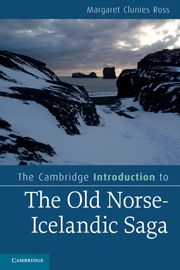Book contents
- Frontmatter
- Contents
- Tables
- A preface on practical issues
- Acknowledgements
- Abbreviations
- Chapter 1 Medieval Iceland
- Chapter 2 What is an Old Norse-Icelandic saga?
- Chapter 3 The genesis of the Icelandic saga
- Chapter 4 Saga chronology
- Chapter 5 Saga subjects and settings
- Chapter 6 Saga mode, style and point of view
- Chapter 7 Saga structures
- Chapter 8 The material record: how we know the sagas
- Chapter 9 Changing understandings of the sagas
- Notes
- Glossary of technical terms
- Guide to further reading
- References to volumes in the Íslenzk fornrit editions of Icelandic sagas
- Index
Chapter 6 - Saga mode, style and point of view
Published online by Cambridge University Press: 05 June 2012
- Frontmatter
- Contents
- Tables
- A preface on practical issues
- Acknowledgements
- Abbreviations
- Chapter 1 Medieval Iceland
- Chapter 2 What is an Old Norse-Icelandic saga?
- Chapter 3 The genesis of the Icelandic saga
- Chapter 4 Saga chronology
- Chapter 5 Saga subjects and settings
- Chapter 6 Saga mode, style and point of view
- Chapter 7 Saga structures
- Chapter 8 The material record: how we know the sagas
- Chapter 9 Changing understandings of the sagas
- Notes
- Glossary of technical terms
- Guide to further reading
- References to volumes in the Íslenzk fornrit editions of Icelandic sagas
- Index
Summary
This chapter will explore the nature of the saga's modality and present it as a modally mixed genre, although conceding that some sub-genres are less mixed than others. It will demonstrate, with selected examples, that such a mixed modality is well suited to the world-view of medieval Icelanders and enabled saga authors to present their material as historically plausible, while at the same time accommodating perspectives on human experience and the natural world that modern readers would classify as fantastic or supernatural. The chapter will also explore the implications of mixed modality for saga style generally, with a close analysis of selected examples. A special aspect of the saga's mixed modality is the prosimetrical character of many, but by no means all, sagas. This important dimension of the Icelandic saga will be investigated here, as will the role of verse in sagas, a subject on which much has recently been written.
Throughout this book, the medieval Icelandic saga is treated as a specific literary genre within which a number of sub-genres can be distinguished. It was conceded in Chapter 2 that some characteristics of the saga genre are shared with other medieval literary kinds, like hagiography, for example, but there are still enough characteristics that are distinctive to the saga to allow us to recognise it with confidence as a unique literary genre or kind. At this point in our analysis it will be helpful to identify the nature of the term ‘literary mode’ and to establish how this concept can aid us in understanding some of the characteristics of saga literature that cannot be fully comprehended within a purely generic or structural analysis. Literary modes exist within a variety of external forms, as, for example, when a novel is described as ‘comic’. This particular modal designation can be applied to a number of literary forms, dramatic, narrative or operatic. Thus, in the case of the Icelandic saga, its generic identity determines characteristics of its form, including such qualities as structure, setting, characterisation and narrative character, while its mode gives the genre its distinction of mood, its approach to the relationship between possibility and actuality as depicted in the saga world. Most modern studies of the Icelandic saga have neglected the genre's literary mode and have consequently been ill at ease with the combination of modalities sagas often display.
- Type
- Chapter
- Information
- The Cambridge Introduction to the Old Norse-Icelandic Saga , pp. 95 - 123Publisher: Cambridge University PressPrint publication year: 2010

